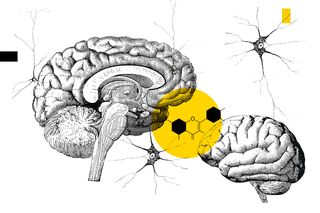
Why We Trust the People We Trust
Research shows that the willingness to trust is hard-wired in our brain.

There is a growing canon of life philosophies and literature that tout trust as a beaming character jewel. “To be trusted is a greater compliment than being loved,” one reads; “He who does not trust enough will not be trusted,” another gushes to assert.
But this quest for assigning credibility to people, places, and things is hardly a conscious act. The question of how people decide to trust has been the focus of a growing body of psychological and neuroscientific research — impacting the way social, personal, organizational, and even national relations are fostered.
So when someone says “I blindly trust you,” chances are they don’t know what they’re talking about. There is barely anything blind or incidental about whom we trust. There is fascinating biochemistry at play here, that positions a brain chemical as the protagonist influencing most social bonding and affiliation. Oxytocin, also dubbed the “love hormone,” is related to our willingness to trust. The work of neuroeconomist Paul Zak, at Claremont Graduate University, is seminal here: his experiments revolve around oxytocin and how it impacts both how we trust and how trustworthy we ourselves are.
Since then, there have been stray experiments or ‘trust games’ to prove the link. Take this one for instance: in 2017, scientists asked 49 participants to play a game in which one participant acted as a broker while the other was a trustee. Working together, they built up a pot of money investing in each other. The only caveat was that one of the participants could steal all the money at any given moment. Some sets of participants, the experiment found, ended up investing a lot of money — meaning they trusted each other without being familiar with each other. The logistics and settings of this game might vary and be innovated, but the idea is the same. Why did some people end up blindly giving the reins to someone?
Before the game, some of the participants snorted a nasal spray laced with oxytocin. Participants who sniffed the oxytocin spray ended up investing more money than those who had inhaled a placebo — indicating that the surge of oxytocin had increased their trust and reduced their fear of trusting strangers.
Neuroscience also reveals that as humans, our brains are hard-wired to trust. A study shows that the willingness to trust is linked to personal upliftment: in participants who trusted each other more, a brain area called the caudate nucleus — one of the brain’s pleasure centers — lit up and became active more quickly upon participants’ feelings. We trust people, the findings hinted, because it rewards one of the brain’s pleasure-seeking centers, making us predisposed to this phenomenon.
“… it’s in our genes and our childhood learning — and by and large it’s a survival mechanism that has served our species well,” Roderick M. Kramer wrote in a study titled “Rethinking Trust” for the Harvard Business Review.
As the link between oxytocin and trust has solidified, scientists have also rallied to understand what supports — or inhibits — the release of this brain chemical. There are four factors: high stress, moderate stress, estrogen, and testosterone. High stress inhibits oxytocin, making it difficult to trust people in nerve-wracking situations. Conversely, moderate stress allows trust to flow more freely, as it promotes the release of the chemical. As social beings, human feelings have evolved to solve problems together and make it easier to depend on others in mildly stressful situations.
The abundance of estrogen is conducive to oxytocin flow, which also explains why women are more likely to trust than men. Testosterone, on the other hand, restricts the flow of oxytocin and makes it harder to trust.
Related on The Swaddle:
Why Do We Crave and Distrust Kindness Simultaneously?
Over time, research has revisited the role of oxytocin in fostering trust and questioned whether it’s as positive an influence as was previously believed. Adam Waytz, an associate professor of organizational psychology at Northwestern University, says, “Another question is, how much are the studies that show the role of oxytocin and trust, how much are those studies able to replicate when administered time and time again?”
He instead offers a psychological view of trust, identifying four key components crucial in this exchange: namely benevolence, integrity, competence, and predictability.
“Benevolence essentially means, is this person a kind person? Integrity means, is this person an ethical person? Competence means, does this person have the ability to do what needs to be done? And finally, predictability means, does this person behave in a way that I can consistently forecast?” Waytz explains.
These factors play out heavily in interpersonal relations, at home or work. Trust has long been hailed as a “game-changer” in bolstering relations and organizational performance. In an individual capacity, while the impact can only partly be quantified, it is still looking on the sunnier side of things: people who traditionally trusted more registered an increase in productivity by 50%, experienced less burnout by 40%, had 29% higher life satisfaction, 74% less stress, and 106% more energy.
Considerations of kindness, integrity, ethics, and competence also assume importance during a pandemic — when trusting someone over digital streams isn’t the most instinctive response. Psychologist Dacher Keltner, along with other researchers, has shown physical touch has a strong bearing on the experience of trust. A pat on the back or an unobtrusive touch on the shoulder makes people more likely to cooperate with people around them. In the absence of this, how we communicate or get along with people will depend on virtual cues or interactions.
This also builds the phenomenon of trusting on tricky grounds — what happens when someone breaks our trust? The cost of a negative response — betrayal, if we wish to be dramatic — can alter on a visceral level how we trust again. A recap of our oxytocin understanding is helpful here: breaking someone’s trust inspires high-stress feelings, and associating any future relations with this can hinder how much we depend on someone.
As far as proverbs and axioms around trust go, here is one by Roderick M. Kramerthat that is perhaps more rooted in reality: “Wanting to trust someone has powerful neurobiological roots, but genuine trust must be earned.”
Saumya Kalia is an Associate Editor at The Swaddle. Her journalism and writing explore issues of social justice, digital sub-cultures, media ecosystem, literature, and memory as they cut across socio-cultural periods. You can reach her at @Saumya_Kalia.
Related


Why Some People Can Hear Color and Smell Words
